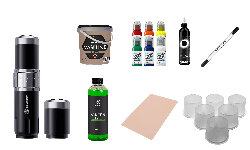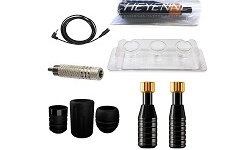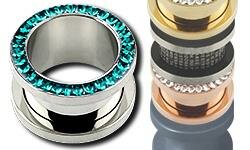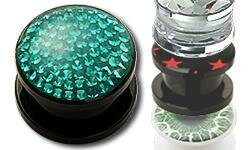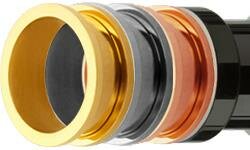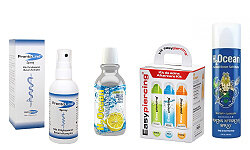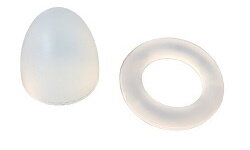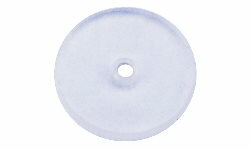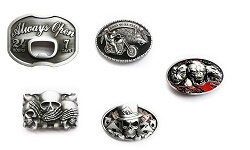Can you mix or dilute tattoo ink?
As you embark on your journey as a tattoo artist, you'll quickly learn that mixing and diluting tattoo inks is an art form in itself. In this detailed guide, I'll show you how to properly mix and dilute tattoo inks to achieve perfect shades and tones for your artwork.
What does it mean to mix or dilute tattoo ink?
Mixing tattoo inks allows you to create a wide range of tones and nuances that go beyond the standard colors available for purchase. Diluting, on the other hand, changes the consistency and intensity of the color, which can be particularly useful when you're trying to achieve fine details or special shading effects.
What can you mix tattoo ink with?
Mixing with other colors: You can fundamentally mix any tattoo ink with another to create a new shade. This requires a good understanding of color theory, as the results can sometimes be unexpected.
Special mixing products: Some manufacturers offer specific mixing solutions that are intended to be used with their inks. These products ensure that the mixture remains homogeneous and that the inks do not lose their quality or durability.
What can you dilute tattoo ink with?
Using special thinners for mixing or diluting tattoo inks offers numerous advantages over traditional methods like using distilled water or glycerin. These professional thinners are specifically designed to preserve the properties of the tattoo inks while enhancing application safety.
Specific formulation
Special thinners are carefully formulated to not negatively impact the chemical structure of tattoo inks. They are compatible with the ink pigments and carrier solutions, meaning they do not cause the inks to separate or disrupt their consistency. This leads to a smooth application and prevents issues like clumping or the ink drying too quickly on the skin.
Enhanced safety
The ingredients in special thinners are often designed to inhibit the growth of bacteria and microorganisms. This is especially important as adding plain water to tattoo inks can increase the risk of infections. Professional thinners contain preservatives that minimize this risk and ensure safe use.
Consistency and control
Another advantage of special thinners is the ability to precisely control the consistency of the tattoo ink. For different tattoo techniques, such as fine lines or detailed shading, the viscosity of the ink can be accurately adjusted. This makes the tattoo artist's job easier and leads to better, more precise results.
Longevity and color quality
Special thinners help maintain the longevity and vibrancy of the colors. They ensure that the colors remain vibrant even after the healing process and do not fade or run. This is particularly important for high-quality tattoos where color quality needs to be maintained over years.
Environmental sustainability
Many manufacturers of special thinners prioritize environmental sustainability. Unlike some conventional solvents, professional thinners are often biodegradable and free from harmful chemicals that could enter waterways. This makes them a more environmentally friendly option for both the artist and the client.
As a tattoo artist dealing with the mixing and diluting of tattoo inks, you should be aware that while distilled water and glycerin are often mentioned as thinners, they are not ideal for professional use. Here you will learn why this is the case and what alternatives exist.
Why are distilled water and glycerin not ideal?
Distilled water:
- Inconsistency: Distilled water can dilute the consistency of the ink, leading to uneven results. It can also affect the adhesion of the ink to the skin by diluting the composition of the pigments.
- Durability: Adding water to tattoo inks can promote the growth of bacteria if not handled correctly. This can increase the risk of contamination, which may lead to infections.
Glycerin:
- Viscosity issues: Glycerin can increase the viscosity of the ink, which might be desired in some cases but often leads to a thicker and harder to control application. This can be problematic especially for fine lines and detailed work.
- Reaction with the skin: Glycerin can sometimes cause irritation on sensitive skin, especially if used in higher concentrations.
Recommended alternatives
- Special thinners from tattoo ink manufacturers: These are specifically designed to harmonize with the pigments without negatively affecting their consistency or color intensity. They often contain additives that inhibit the growth of bacteria and make the application safer.
- Manufacturer-specific mixing solutions: Some tattoo ink manufacturers offer their own mixing solutions that are precisely tailored to their color formulas. These mixing solutions ensure that the inks maintain their consistency and brightness without increasing the risk of skin irritation.
Conclusion
Choosing the right thinning agent is crucial for the quality and safety of your tattoo work. Avoid simple solutions such as distilled water or glycerin, which can compromise the quality of the inks. It is advisable to invest in specialized products that are specifically developed for use in the tattoo industry. By doing so, you ensure that your tattoos are not only aesthetically pleasing but also durable and safe.
For tattoo artists who value high quality and safety, special thinners are an ideal choice. They not only provide technical benefits during application but also contribute to the longevity and overall appearance of the tattoos. By investing in these professional products, you can minimize the risk of skin irritation and infections for your clients while achieving excellent artistic results.







 Black
Black White
White Grey
Grey Brown
Brown Red
Red Yellow
Yellow Pink
Pink Skin Tones
Skin Tones Orange
Orange Violet
Violet Green
Green Blue
Blue

























